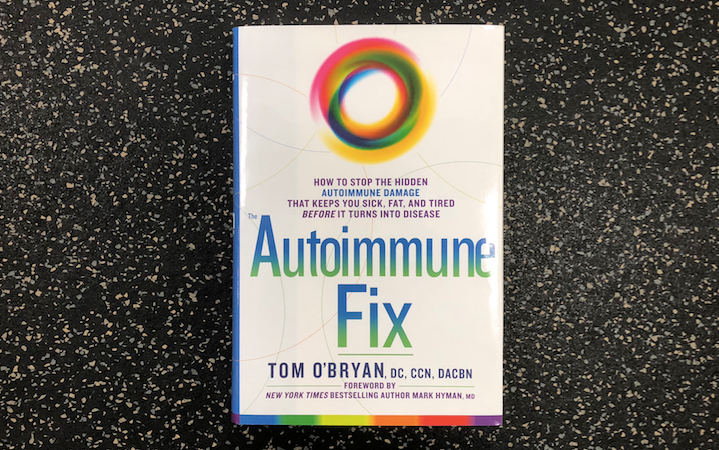
YPSI Book Review – „The Autoimmune Fix“ by Dr. Tom O’Bryan
An autoimmune reaction is something often associated with certain medical conditions. An autoimmune reaction basically means that one’s own immune system attacks the own body, tissue and cells. On a continuum of severity of autoimmunity this will will lead to degenerative diseases on the far left. On the other end of this continuum, on the far right, there is high performance. High physical and cognitive performance paired with great health. One thing everyone wants to achieve. In a training context this means to get stronger, build more muscles and loose body fat. And this is where autoimmunity comes into play from my perspective as a strength coach and personal trainer. With the question being: How do we minimize and optimize Autoimmunity to look better, move better and feel great.
Dr. O’Bryan’s book „The Autoimmune Fix“ gives great insights into this topic, from a medical perspective and from a practical perspective. It points out the primary symptoms – joint pain, weight gain, brain fog, gut imbalances, depression, mood disorders and fatigue – and points out the severe increase of autoimmunity in the last decades. Autoimmunity is a multi-factorial problem that therefore needs to be addressed from multiple angles. Nutrition and all its aspects being the primary tool that Dr. O’Bryan uses and addresses in the book.
Three highlights that the book points out:
1. Grain doesn’t equal Gluten and Gluten is not necessarily bad – Gluten is one of the most common facilitators of autoimmune reactions. What needs to be considered is that there are different types of gluten proteins. Not all are created equal. For example wheat and oat both contain gluten, they contain different types of gluten, compared to wheat, rye and barley which contain the same type of gluten. Which is also statistically the type of gluten that causes the greatest amount of immune reaction and inflammation. Still some people react much better on rye and barley compared to wheat. The action call „go gluten free“ is quite simplified and needs to be fine-tuned in individual cases for the most sustainable change. Those who react just to wheat also benefit from going „glutenfree“, although these people often do not need to restrict rye, barley, and oats. Gluten sensitivity is a controversial subject, where people who have neither Celiac Disease – which is a strong inflammatory response of the intestines to gluten – nor wheat allergy have varying degrees of symptomatic improvement by going „glutenfree“. As more literature is being published on the topic of non-celiac gluten sensitivity, what is emerging is a condition greater than 6-fold more prevalent than Celiac Disease with associations to many more conditions that diminish wellbeing and performance. In simple terms, there is more to grain and gluten than just gluten sensitivity, wheat allergy and especially celiac disease. These needs to be differentiated to get the most sustainable solution for one person. Just cutting all grain and gluten is a simple approach that works, in some cases just not necessary and in many cases just not sustainable.
2. The absolute necessity of a healthy microbiome – A huge chunk of our immune system sits in the intestines. And the intestines are the home of the microbiome which is the community of bacteria, yeasts and viruses that live in the human gut. The microbiome has been recognized in the last 10 years as a crucial backbone of human performance and health. It is critical for much more than just digesting food. It is one of the control centers for the entire body. The microbiome is linked to regulating metabolism, managing blood sugar, influencing genetic expression and brain chemistry. The microbiome is one of the hottest topics in medical research today. In 2007, 396 research papers were published on the subject of the microbiome. In 2015, there is already an astonishing number of 5.512 research papers published on the microbiome. Thats 5.512 research teams that spent months on studying this topic. And many of the findings on wellbeing and performance are revolutionary. The microbiome can weigh up to 5 pounds which is nearly twice the weight of a brain and there are nearly 10 times more cells of bacteria in our gut than all the rest of the cells in our body together. Considering this size and significance of the microbiome its a main pillar to optimize wellbeing and performance, increase fat loss and training progress. Many things can have a negative impact on the microbiome. Its crucial to avoid these. Many things can have a positive impact on the microbiome. Its crucial to focus on these. Starting from food, lifestyle, supplementation and sleep to training, stress management, environmental toxins and gene expression. In this book Dr. O’Bryan gives an look into each of these from a technical and a practical perspective as managing the microbiome is a central aspect of managing autoimmunity.
3. The fork is the most powerful tool we have to transform our body – Nutrition is key. We become what we eat. Technically our food eventually turns into our cells. Nonetheless a sustainable and enjoyable approach to nutrition and eating that works well for years, is still what many are looking for. And a major reasons why many are hiring personal trainers and nutritionists. Dr O’Bryan’s approach to nutrition initially focuses on lowering inflammation followed by rebuilding the intestinal integrity which will based on whats addressed above on the microbiome. So therefore will optimize the metabolism, improve blood sugar management, regulate genetic expression and super charge brain chemistry. Centering an approach to nutrition around inflammation, a central component of autoimmunity, and intestinal integrity by making better and more sustainable food choice is a fascinating perspective and also a central concept of Functional Medicine.
On over 300 pages Dr O’Bryan gives a great look into autoimmunity and provides a practical protocol to labtests, supplementation, nutrition and lifestyle divided into multiple phases to not just loose weight – which is a quite one dimensional goal – but also addresses the immune system, intestinal health and genetics. Its a great read on many hot topics of Functional Medicine.
Who is Dr. Tom O’Bryan?
Dr. Tom O’Bryan is an internationally recognized speaker and author on chronic disease and metabolic disorders. He is considered the world expert on the impact of gluten sensitivity on autoimmunity. Dr. O’Bryan has more than 30 years of experience as a functional medicine practitioner and is a member of the teaching faculty at the Institute of Functional Medicine.
Dr. O’Bryan will teach the YPSI Autoimmunity & Gluten Sensitivity Seminar on September 15th/16th this year at the YPSI in Stuttgart, click here for more info
Order the book here on Amazon
Bestell das Buch direkt hier auf Amazon
Picture: The book.
